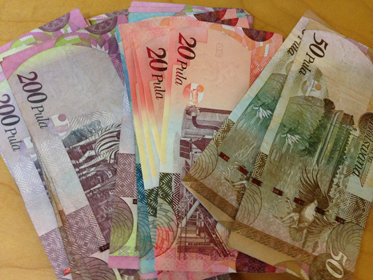Botswana Costing Study: Outsourcing Adds Value, Boosts Quality
To deliver better quality services at a lower cost, the Government of Botswana has been pursuing a strategy of outsourcing nonclinical hospital services ‒ such as laundry, cleaning, and security ‒ to private vendors since 2011. In theory, outsourcing these services should save hospitals money – money that could then be used to buy more medical supplies, and to pay nurses and doctors. But hospital managers have been signing outsourcing contracts without knowing whether outsourcing really offers them a better deal than their current systems.
“I’m paying Botswana pulas 80,000 ($8,000) a month for cleaning, but I don’t know how much I was paying previously – is this better or worse? There is no way of comparing,” said a contracts officer at a government hospital that is outsourcing nonclinical services.
USAID, through the HFG project, recently conducted a study at five government hospitals to determine the “benchmark” costs of providing nonclinical services in-house. HFG also completed a case study of the costs and benefits of outsourcing cleaning services at one of the hospitals, the Mahalapye Hospital in the Central District. The findings should help hospital managers make more informed decisions regarding whether or not to outsource services.
The first study found that considering both the costs and the benefits at Mahalapye Hospital, outsourcing provides greater value for money in terms of ‘cleanliness per pula spent’ than providing cleaning services in-house. While outsourcing was more expensive than paying hospital staff to clean, the cleanliness of the hospital improved dramatically after the cleaning services were outsourced to a private company.
“There is much improvement in terms of level of cleanliness,” remarked the infection control officer at Mahalapye Hospital. The hospital paid approximately BWP 219 ($24) per square meter per year to contract out cleaning services compared to its own cost of BWP 173 ($19).
In essence, Mahalapye Hospital is getting cleaner hallways and patient rooms, more effective waste removal, and safer storage of cleaning chemicals for only about $5 more per square meter of hospital area. The results suggest that by paying a private company to clean the hospital, Mahalapye would gain the equivalent of BWP 1.7 million ($182,000) worth of ‘additional cleanliness’ over five years.
While the case study focused on Mahalapye Hospital, other hospitals reported a similar improvement in the quality of nonclinical services after outsourcing. In a survey of nurses at the seven hospitals that are currently outsourcing, 61 percent said the quality of cleaning services have improved, 75 percent claimed that laundry services have improved, and 50 percent felt security services are better since outsourcing.
The benchmark costing exercise provided other important information for hospital managers, such as the price of providing services in-house varies greatly among different hospitals. For example, the price of cleaning ranged from BWP 175 ($19) per square meter cleaned to BWP 1350 ($145) per square meter. The cost of laundry was between BWP 1.65 ($0.18) and BWP 14 ($1.50) per kilogram of linens. The study also found that the cost of supplies, such as soap, cleaning solutions, and laundry detergent, made up the majority (53 percent) of the costs of nonclinical services, followed by human resources.
HFG’s study offers hospital managers valuable guidance about how to think about the costs and benefits of outsourcing and what sort of data they should collect to make informed decisions. Key lessons learned from the analysis include:
- Costs are only half of the equation. When deciding whether or not to outsource, hospital managers should consider whether improved quality of the services would justify a higher price.
- Managers of hospitals that are already outsourcing should regularly monitor the vendor’s performance to ensure they deliver the quality of the services that was promised.
- Hospital managers need to know the production units of the services they wish to outsource, such as the floor area that needs to be cleaned (in square meters) and the quantity of linens to be laundered (in kilograms) to evaluate bids from private vendors.
- Outsourcing should get cheaper, and the quality of services should improve, as vendors and hospitals gain more experience working together.
Armed with new knowledge and evidence, Botswana’s public hospitals are better positioned to reap the benefits of the country’s outsourcing strategy.




